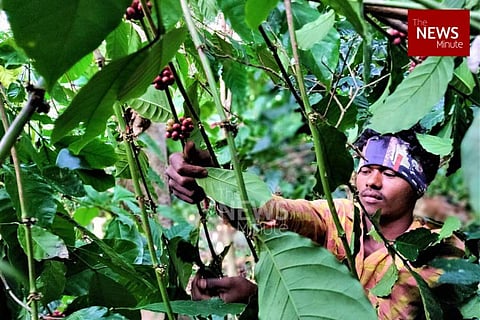

The fate of the famous Araku coffee brand of Andhra Pradesh is in jeopardy as the Union government has stopped extending wages under the Mahatma Gandhi National Rural Employment Guarantee Scheme (MGNREGS). The move is expected to impact over 1.60 lakh farmer, mainly from tribal communities, engaged in coffee cultivation in the state.
The Union government in September 2020 issued a notification to Andhra Pradesh Panchayath Raj and Rural Development informing that the NREGS will not be extended for farmers engaged in coffee cultivation. The states Chief Minister YS Jagan Mohan Reddy even wrote to the Indian Prime Minister Narendra Modi the same month asking him to reconsider the decision of the Ministry of Rural Development (MoRD). However, there was no response from the Union government, say officials who warn that without wage support, the tribal coffee farmers will be unable to sustain growing the Araku coffee leading to the gradual decline of the brand itself.
Raising new coffee plantations on tribal lands under NREGS began from 2009-10 as an area-specific work in the tribal areas of the Eastern Ghats in the Vishakapatnam distroct. Under the additions made to the scheme, only wage components for activities like pitting, planting and intercultural operations are taken up. Presently the Araku coffee is grown across an estimated 1 lakh acres and the average landholding size per farmer is just 1.25 acres, says the ITDA.
Officials reasoned with the MoRD that as per the provision of Schedule 1 of the Mahatma Gandhi Employment Guarantee Act 2005, horticulture, sericulture, plantation and farm forestry are permissible activities for improving livelihoods. As per the guidelines of the annual master circular for the works undertaken, any plant that is perennial in nature and suitable to the agro-climate conditions can be taken up for plantation under the scheme.
However, the Union government has reasoned that coffee is not a cash crop and hence should not be linked to NREGS, says Dr Venkateshwar, Project Officer with Integrated Tribal Development Agency (ITDA), Paderu division where the Araku coffee is grown, “Coffee is a cash crop, but cash crops are not included in NREGS. The objective of NREGS is to prevent rural migrant and provide some kind of livelihood, it was originally not intended for cash crops but in tribal areas coffee isn’t a cash crop, its a livelihood crop. If you see Karnataka, Tamil Nadu and Kerala, coffee is grown in estates. There was pressure from other states to include coffee in NREGS in those states. But in Andhra, it’s grown exclusively in tribal areas. It’s a special case,” he adds.
“On the ground, the farmers weren’t even aware that the support had been cut off,” says B Chakradhar, Program Officer with LibTech India, a team of engineers, social workers, and social scientists working towards improving public service delivery in India. "The farmers are in a precarious situation and don’t know what to do. All these years the governments promoted coffee, even though the crop isn’t native to the tribals, it was thrust upon them. The farmers get Rs 50,000 per year from the crop, this is a huge amount for the tribal farmers. Now suddenly that support is taken off what will happen?” he asks.